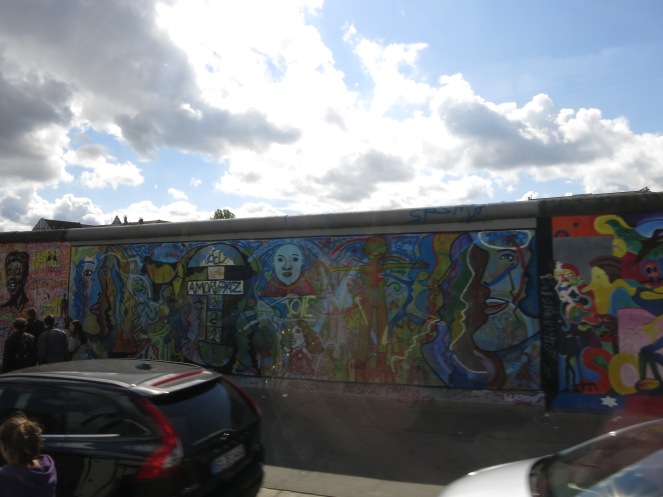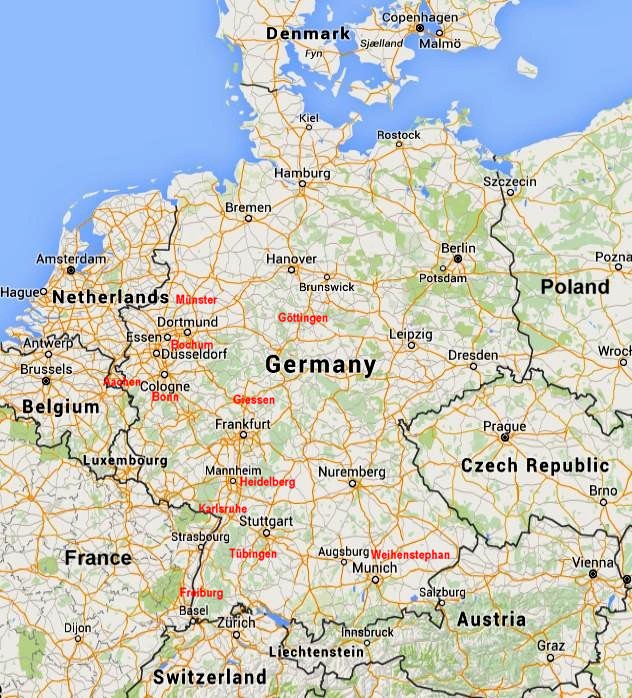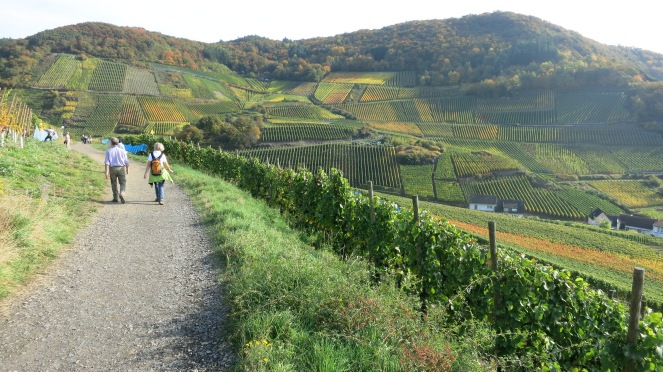This is a guest post about Germany written by Wolfgang Zöllner, a German novel writer and likes hiking in Andalucia. Wolfgang also enjoys hiking in Korea and thinks that Koreans and Germans should know more about each other. Therefore he is very pleased that he got the chance to make a small contribution to my blog. Please have a look at Wolfgangs hiking website www.wandalus.de (in German).
Thank you Wolfgang for teaching us so much about Germany! It is a really informative and insightful post~
People from Europe who plan for travelling to East Asia usually have in mind: China – Thailand – Vietnam, perhaps Japan. But what about Korea? If you happen to understand this question you probably will understand the next question too: People from Asia who intend to travel to Europe usually have in mind: Paris – London – Italy – perhaps Spain and Norway. Well, 75 million foreign tourist have visited Germany in 2015. Compare this to the 82 million tourists which travelled to France!
Germany has much in common with Korea: not long ago a divided country; a hard working and highly motivated population (while working only 35 hours a week and enjoying 6 weeks vacation per year). The country is a global export champion (and travel champion too). Both contries live from brain, not from raw materials and they both have a highly diversified landscape.
Now what would you miss if you don’t travel to Germany?
Fifteen German places you should definitely not miss:
- Berlin – New Years Eve party at the Brandenburg Gate (Brandenburger Tor), Pergamon Museum, East Side Gallery, boat trip on river Havel, the Zoo (Tiergarten).

- Munich – Oktoberfest (second half of September), Schwabing, English Garden with the Chinese Tower, Deutsches Museum (German Museum – the best technical museum in the world), drink always a beer at Hofbraeuhaus.

- Cologne – Cathedral (Dom), Carnival (especially Rose Monday Procession). The date varies between early February and early April.

- Neuschwanstein – The castle of Bavarian King Louis II in front of a beautiful alpine landscape.

- Sylt – the island of the super rich at the northern border of Germany with beautiful beaches and original northern homes with thatched roofs.

- Dresden – the Saxonian capital in the sweet valley of river Elbe in Eastern Germany. This city had been completely destroyed in January 1945 by air raids and was originally rebuilt. Enjoy a concert at Semper Opera or at Frauenkirche (Church of the Holy Virgin), visit the ‘Zwinger’ and the ‘Gruenes Gewoelbe’ nearby.

- Hamburg – the third largest port of Europe with Reeperbahn (the most ‘sinful mile of Germany’) and Elbphilharmonie (a spectacular music theater in the port).

- Rothenburg ob der Tauber – a complete medieval town in it’s original fashion.

- St.Bartholomae peninsula in Königssee (King’s Lake), a deep lake in an alpine canyon at the southern Border of Bavaria. Enjoy your own echo from the rock walls and drink one Mass (1 litre) of Bavarian beer in the calm of Saint Bartolomae, which you reach by E-boat.

- Rhine river boat trip from Cologne to Mainz, where the Rhine is passing the famous Loreley Rock, steep vineyards and so many ancient castles on the hills.

- Mittenwald, a typical Bavarian town in the Alps, where violins are constructed manually.

- Meyers Shipyard at Papenburg, where the biggest cruiseships are built or refurbished. Papenburg is not a seaport, but lays 60 km off the sea at the river Ems. Enjoy the spectacle of maneuvering a cruiseship on the small river to the seaport of Emden.

- Enjoy unlimited speed on German Highways (Autobahn). Book a 6 days self driving tour by Porsche or Audi.

- Visit a Baumarkt (hardware supermarket). You will find one in every town. Germans are keen for ‘do it yourself’ in their houses.

- If you happen to visit Germany in December, visit a Weihnachtsmarkt (Christmas market) at Nuremberg or Dresden

- If you are a hard rock enthusiast, then don’t miss the Wacken Hardrock Open Air Festival in early August on the meadows of the small village Wacken nearby Hamburg. Be prepared to listen to the bands ‘deep in the mood’, as this is a rainy area.


Understand the main differences between Germany and Korea:
Not every important function is concentrated at a single capital like Seoul or Paris. Germany is a Federal Union based on 17 states and vital functions are wide spread all over the country:
- The Federal Parliament (Bundestag) and the Federal government are at Berlin.
- The High Court is situated at Karlsruhe.
- The army, German Telekom and German Postal Service are headquartered at Bonn.
- The airforce haedquarter is at Cologne and the marine headquarter at Wilhelmshaven.
- Germany’s largest international airport, the European Central Bank and the world’s largest Book-exhibition (Frankfurter Buchmesse) are located at Frankfurt.
- Munich hosts BMW and the famous soccer club Bayern Muenchen.
- VW is located at Wolfsburg, Audi at Ingolstadt, Daimler, Porsche and Bosch at Stuttgart.
- Dusseldorf has the ‘largest bar counter’ (Altstadt) of the world (one mile along river Rhine) and the largest population of Japanese, Chinese and Korean businessmen in Germany, is the capital of Germany’s telecommunications industry and of chemical giant Henkel and hosts the world’s largest fairs for boats (Boot), printing industry (Drupa) and outdoor accessories (TourNatur).
- At Hanover you find the largest industry exhibition in the world (Hannover Messe).
- At Berlin you find Europe’s largest consumer electronics fair (Funkausstellung) and the largest German community of internet startups.
- Cologne hosts the largest Games exhibition worldwide (Gamescom) and the busiest main station of Germany.
- Nuremberg hosts the largest toys fair (Spielwarenmesse) in the world. Essen is the capital of Germany’s power industry.
- At Hamburg the Airbus Jets are premounted.
- Germany’s strong Chemical industry is concentrated at Leverkusen (Bayer and Lanxess) and Ludwigshafen (BASF).
- At Duisburg you find Europe’s largest river port. Adidas produces its sportsware at Herzogenaurach, a small town in Bavaria.

- Germany follows a ‘green’ policy. The last nuclear power station (out of previously 24) will be closed in 2022. In 2015 29% of the total demand for electric power is already produced by green energy (wind, bio-waste and solar power). The goal is 100% green energy in 2050.

- Germany is a multicultural nation. 24% of the population has a migrant background. In 2015 alone, more than one million refugees from Syria, Iraq, Afghanistan, Eritrea, Kosovo and Albania have asked for asylum and have stressed the public infrastructure and the public opinion. Even 30.000 migrants came from Israel (remember that the Nazi regime had killed 6 million Jews between 1933 and 1945). In addition another million people moved to Germany from other EU countries, while 1.6 million Germans and migrants left Germany. There exist some right-wing movements against foreigners, especially in Eastern Germany. But the majority of Germans is still openminded towards foreigners.
- As a result of World War II, Germany was a divided country, but by chance could be reunified in 1990 after the Berlin wall fell down. However Germany has lost one third of his territory forever to Poland and Russia. To overcome the economic shortcomings of the separation, Germany had to invest 1 trillion Euros (1,250,000,000,000 Won) so far.
- German food is quite different from food in Korea. Germans don’t eat Kimchi and consume only small portions of rice and seafood (no seaweed, no raw fish, but on the beach try Matjeshering (raw herring), seldom soups. If you are used to eat Kimchi, you should taste Sauerkraut (cabbage) together with Bratwurst (fried sausage) or Leberkaes (a quadratic ‘sausage’). At breakfast and dinner Germans prefer bread which tastes ‘dry’ to Koreans. Most Germans eat warm meals at lunch. They prefer pork, beef and potatoes and sometimes sweet meals like Kaiserschmarrn or Pfannkuchen (pancake). There are a lot of Italian, Turkish, Chinese and Hamburger restaurants. In large cities Japanese and Korean restaurants can be found as well. Germans do not use chopsticks.
- Germans do not take off shoes when entering restaurants, private homes or temples (with the exception of muslim mosques). Don’t wait until someone offers you some food by two outstretched arms. Instead practice self service, otherwise you’ll starve.
- In Germany there is no dominant religion. 29 million people have no religion, 24 million are catholic, 23 million protestants, 6 million muslims.
- Germany shares land borders with nine European countries: Denmark, Poland, Czech Republic, Austria, Switzerland, France, Luxembourg, Belgium, Netherlands. EU citizens may pass those borders without control. Non EU-citizens have to show their passport and to declare their goods at the customs. As Germany lays in the heart of Europe with open borders you will enjoy traffic jam from so many trucks on the highways! Admire the caravan of caravans on the highways; especially the Dutch tourists travelling by their mobile homes! Many goods are also transported on rivers and channels. Enjoy the cheapest food prices in the world at the supermarkets of Aldi and Lidl.
- Germany is not as overcrowded as Korea. Instead you often will feel a little bit alone. Unlike Korea you will meet more seniors than juniors on the streets.
- In Germany there are no chaebols. Instead hundreds of medium sized companies are often global hidden champions in their categories of goods. In Germany, unimployment is at a alltime low. Social insurance standards are very high. Seniors enjoy high pensions and medical care is for free if you are a member of the public health insurance system.
Studying in Germany:
Germany has a long tradition and strong reputation of high level education and research. 99 Nobel laureats came from Germany (Albert Einstein, Otto Hahn, Max Planck, Walter Heisenberg Wilhelm Conrad Roentgen, Robert Koch, etc). Many professionals from Korea have studied at the Technical Universities of Aachen, Munich and Karlsruhe. Korean Musicians and singers learned at Clara Schumann Music Highschool at Duesseldorf. Korean artists like Paik Nam-Jun studied at Kunstakademie of Duesseldorf. Famous universities for medical sciences can be found at Hanover, Duesseldorf, Giessen and Heidelberg. Good law schools are available at Bonn, Muenster and Goettingen. Best for Economics are the Universities of Mannheim and Cologne. East Asian Studies can be performed at Bochum and Cologne. Sports is famous at Cologne and Freiburg. Philosophers prefer Tuebingen and Bremen. For Ecological studies try the universities of Freiburg, Bremen and Kiel. You may even study beer brewing at the university of Weihenstephan nearby Munich.
A basic prerequisite for studies are good German language skills. You may get them at German ‘Goethe Institut’, which is also available at Seoul, Daejon, Daegu, Pusan and Gwangju. Universities are free of charge but you have to pay for your private accomodation and living expenses. In Germany there is not such a high pressure on young people like in Korea to get a place at a university. There exists also a strong alternative education path for skilled workers in the industry which may result in a ‘masters’ degree (Meister). Education at German universities is not as fact-oriented as in Korea and a professor is not treated as a ‘sonsaengnim’. Students are encouraged to question and discuss results of research, to shape their own opinion and judgement and to talk freely. Students are also encouraged to perform some of their studies in foreign countries.
Graduates have the chance to work at famous research labs of Helmholtz Society or Max Planck Society or in the German industry.

Education map
How to travel to and inside Germany:
There are nonstop flights from Incheon (ICN) to Francfort (FRA) and Munich (MUC), operated by Lufthansa, Korean Airlines and Asiana.
Inside Germany or from Germany to European destinations you will prefer lowcost carriers like Air Berlin and Ryanair. Be careful: Ryanair is the cheapest air carrier but often starts from minor airports. If Ryanair announces a flight from Duesseldorf to Milan (Italy), departure is not Duesseldorf Airport (DUS), but Weeze, a village 40 km north of Duesseldorf and the arrival is not Milano Malpensa, but Bergamo, a town 70 km away from Milano.
If you ask for help, most people will understand English. Don’t be surprised if German English sounds different than Korean English – both do not sound like UK English!
The German railway net is quite dense. There are ICE highspeed trains (like KTX in Korea) which connect all major cities and EC long-distance trains that connect European cities.

A special highspeed train called ‘Thalys’ connects Cologne to Brussels and Paris. Some cities are connected by nighttrains, so you need no hotel. In local trains only you may carry your bycicle at a small extra fee. Be aware that many rail links are not operated by the German Railway Authorities (Deutsche Bahn AG), but by private carriers. You can buy tickets for all sorts of rail links at rail-stations of Deutsche Bahn AG or from the internet. Small stations have no ticketcounters on the platform, but you can buy tickets at ticket vending machines. Sometimes you have to depriciate your ticket at a stamping machine befor you enter the train. If you don’t, you may have to pay a fine of 60 Euros (75,000 Won).
Unfortunately trainstations are not as clean as in Korea. If you intend to travel through Europe by train, young people may buy the ‘Eurail Trail Pass’ which is a flat rate ticketpassport for a given timeframe regardless of how many countries you pass.
The cheapest – but more timeconsuming – way to travel long distances is by private bus companies like Flixbus or Postbus which are often operated at night.
The smartest way of travelling is by bycicle. Germany owns a smart grid of cycleways in very good condition. Have a look at the City of Muenster – bicycles can be a main transport vehicle inside a city. Hikers will also enjoy Germany. There are fantastic hiking trails in the mountains, along the beaches and rivers, or in the woods. Try Rotweinweg (Red Wine Trail) along river Ahr or Rheinsteig along river Rhine or Partnachklamm (a steep canyon) in the Alps nearby Garmisch. You will also find European Long Distance trails that connect European countries. Don’t miss traveling on main rivers by a cruise ship. Candidates are the rivers Rhine, Mosel, Main and Elbe.

Are you now ready for Germany?
Thx for sharing.Great
I planned to go China, but suspended by the coronavirus, so can only learn Chinese at home and took the live online lesson by communicating with native-Chinese teachers from eChineseLearning
It seems good currently. Do you think this method of learning is realistic?
LikeLike
Hi Alleace, thanks for stopping by 🙂
Chinese is a difficult language, but mastering the basics isn’t as hard as becoming fully fluent. My family is originally from China, but I was born and grew up in Spain. I learned it since I was a child and went to Chinese class once a week after school with other children around my age. Even then, I can only claim I speak it fluently for an expat.
To really learn the language, you’d have to be fully immersed in it, meaning living in a Chinese speaking environment for years. But don’t let this discourage you! I’ve met plenty of people that learned enough online to travel, and with each visit, you learn more. It’s easier to learn words or sentences that you experience, so don’t be afraid and practice a lot, don’t feel ashamed of speaking Chinese and making mistakes, and asking people to correct you!
LikeLike